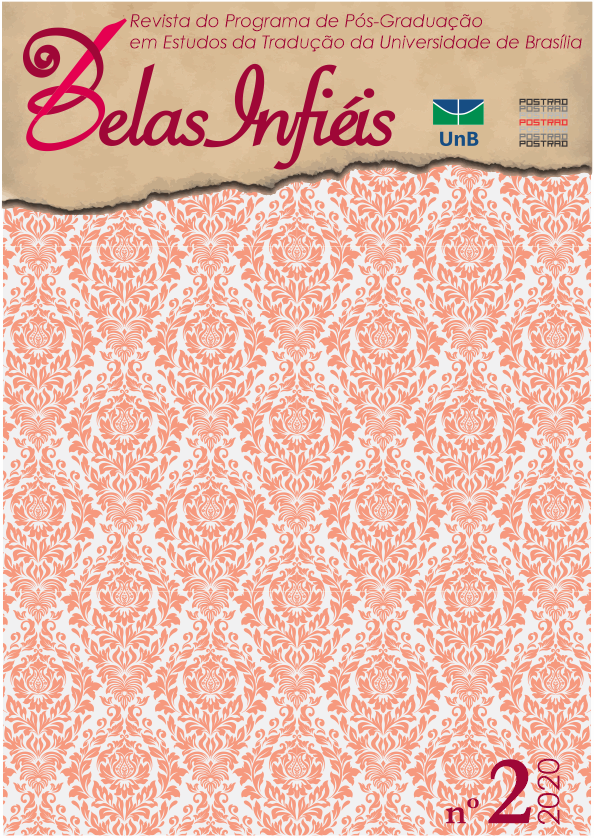Poesia colombiana contemporânea: poemas de Orietta Lozano traduzidos
DOI :
https://doi.org/10.26512/belasinfieis.v9.n2.2020.27699Mots-clés :
Tradução. Poesia colombiana. Orietta Lozano.Résumé
Orietta Lozano nasceu em Cali, Colômbia, em 1956, onde reside até hoje. É poeta, ensaísta e novelista e apresenta uma produção poética expressiva iniciada na década de 1980. No entanto, mesmo tendo composto diversas antologias nacionais e internacionais, sendo uma delas brasileira, organizada pela poeta Lucila Nogueira e por Floriano Martins em 2007, a obra de Lozano ainda é pouquíssimo difundida no Brasil, sendo mais conhecida na Colômbia e no México, apesar de haver traduções de poemas também para o inglês, o francês e o italiano. Os poemas aqui apresentados e traduzidos, Danza e Despojada, integram a segunda publicação da autora, Memoria de los Espejos, de 1983, e podem ser considerados bons representantes da poética de Orietta Lozano, pois revelam imagens que evocam uma força sensitiva dos elementos, uma linguagem repleta de um desejo transgressor fundamentado num tempo mítico, num jogo místico.
Téléchargements
Références
EL ESPECTADOR. Escribo para ver el resplandor: Orietta Lozano. 2015. Disponível em: https://www.elespectador.com/noticias/cultura/escribo-ver-el-resplandor-orietta-lozano-articulo-580560 Acesso em: 15 fev. 2020.
LOZANO, Orietta. Memoria de los espejos. Bogotá: Ediciones Puesto de Combate, 1983.
LOZANO, Orietta. La herida de los siglos. Bogotá: Uniediciones, 2015.
MARTINS, Floriano; NOGUEIRA, Lucila. Mundo Mágico: Colômbia- Poesia Colombiana do século XX. Recife: Editora Bagaço, 2007.
MENDINUETA, Lauren (org.). Um país que sonha: Cem anos de poesia colombiana. Lisboa: Assírio e Alvim, 2012.
Téléchargements
Publié-e
Comment citer
Numéro
Rubrique
Licence
Copyright Statement
Given the public access to this journal, the texts are free to use but requires the recognition of the original authorship and initial publication in this journal to be properly stated.
The journal allows the use of works published for non-commercial purposes, including the right to submit the work to publicly accessible databases. Published contributions are the sole and exclusive responsibility of the author(s).
- When submitting papers to be evaluated by the Belas Infiéis journal, the author(s):
- Declare that the contents of the contributions are original and of their original creation, being entirely responsible for their content if there is an objection by third parties.
- Claim to be aware that they should not commit academic plagiarism.
- Declare that the manuscript has not been published, completely or partially, in Portuguese or another language. If it is a translation it should be submitted to the Translated Articles section.
- Declare that the manuscript is not being evaluated by other journals.
- Declare that the manuscript was not submitted to another journal simultaneously.
- Commit(s) to inform the journal of any kind of error or inaccuracy in their contribution (published, in evaluation or in editing) and to collaborate with the editors to make due corrections of the article (when in evaluation or editing) or erratum/retraction (after publication).
- Declare that there is no conflict of interest regarding the published work.
- Authorize its release if it is accepted for publication without any kind of monetary compensation.
- Agree to assign non-exclusive rights to publication to the magazine, remaining free to make their contribution available in other media as long as the publication of the first version in Belas Infiéis magazine is mentioned. They also authorize Belas Infiéis to assign their texts for reproduction in content indexers, virtual libraries and similar platforms.
- Maintain copyright and grant the journal the right of first publication, the work being licensed under theCreative Commons Attribution License.
- Is/Are allowed and encouraged to publish and distribute their work online after the editorial process, which may increase the impact and citation of the published work.
- Authorize the editorial team to make textual adjustments and to adapt the article to the publication rules, when necessary.



















